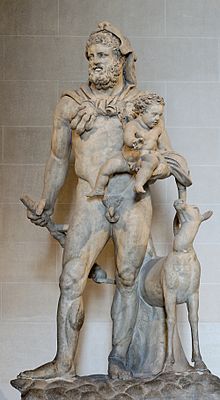
In Greek mythology, Telephus (/ˈtɛlɪfəs/; ‹See Tfd›Greek: Τήλεφος, Tēlephos, "far-shining")[2] was the son of Heracles and Auge, who was the daughter of king Aleus of Tegea. He was adopted by Teuthras, the king of Mysia, in Asia Minor, whom he succeeded as king. Telephus was wounded by Achilles when the Achaeans came to his kingdom on their way to sack Troy and bring Helen back to Sparta, and later healed by Achilles. He was the father of Eurypylus, who fought alongside the Trojans against the Greeks in the Trojan War. Telephus' story was popular in ancient Greek and Roman iconography and tragedy. Telephus' name and mythology were possibly derived from the Hittite god Telepinu.[3]
- ^ Heres and Strauss, p. 865, LIMC 8705 (Telephos 38).
- ^ See for example, Knight, p. 433. According to the mythographic tradition, Telephus' name derived from his being suckled by a doe, e.g. Apollodorus, 2.7.4, 3.9.1 (Frazer note 2 to 2.7.4: 'Apollodorus seems to derive the name Telephus from θηλή, “a dug,” and ἔλαφος, “a doe."'). See also Huys, p. 295 ff.; Webster, pp. 238–239; Hyginus, Fabulae 99; Diodorus Siculus, 4.33.11; Moses of Chorene, Progymnasmata 3.3 (= Euripides, Auge test. iib, Collard and Cropp 2008a, pp. 266, 267): "He got his name from circumstances". According to Kerényi his name was "more accurately ... Telephanes, 'he who shines afar'" (Kerényi, p. 337). The feminine form is Telephassa, of whom Kerényi writes, "She bore the lunar name Telephassa or Telephae, 'she who illuminates afar', or Argiope 'she of the white face'". (Kerényi, p. 27).
- ^ Dignas, p. 124; Stewart p. 113.